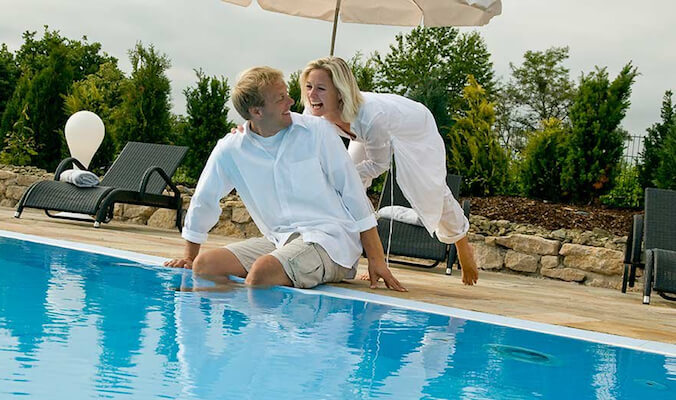The Pursuit of Happiness

© Hotel Freund, Germany
On March 20th we are celebrating the international “Day of Happiness”. Already in the Greco-Roman antiquity, philosophers, scientists and psychologists were wondering about the subject of happiness and what it means – why we are striving after it and how we can finally obtain it? Not much changed, as the same questions apply to our modern world.
The story
Even the United Nations recognized the huge significance of happiness. It was due to the initiative of Bhutan that a summit meeting of the UN was convened in 2012 dealing with the issue “happiness and well-being”. Already in the 1970s, Bhutan declared the “pursuit of happiness and well-being” as top national objective. Furthermore, the ”National Gross Happiness” indicator was generated to measure the level of happiness of Bhutan’s population. In Bhutan, the “National Gross Happiness” has far more significance than any gross national product!
It was at the mentioned summit meeting, which Ban Ki-moon himself had convened, that the UN passed a resolution declaring well-being, happiness and satisfaction as effort and aim of all people and calling the governments and institutions worldwide to put this in the centre of any public or political action. To illustrate this concern, the 20th of March was declared as official and global “Day of Happiness”, commemorated annually since 2013.
The reason
But why are we striving for happiness and well-being? Deeply rooted within us lays both the instinct for survival and the urge to produce descendants. To nourish and protect them secures the survival of our own genes. This creates the urge to develop ways and means to achieve this goal – and in this respect our evolutionary development. Without this urge, there would be neither fire nor medical, social or economic progress today. Stagnation is not part of this concept – we have no choice but to constantly strive forward. The pursuit of happiness and well-being seems to be a primary instinct.
The struggle to survive was replaced by the desire for a better life during the last several decades. In a setting where hardly anybody has to worry about food and shelter, the focus is on the next target, surpassing the mere livelihood by material luxury. The quest for happiness follows this desire for material luxury. We want this with the help of culinary wonder weapons which promise healing, like the so-called “superfoods”, or by new wellness treatments, imported from all over the world. However, this doesn’t lead to a permanent solution, but to the search for even more expensive wonder weapons, like a perpetual search for the next short-term thrill.
So what can we do now?
Maybe we are looking at the wrong place. Perhaps we can only find happiness at our home. Maybe we are genetically programmed to only feel healthy and well in the surrounding where we and our ancestors were born and raised – so to speak, in our own natural habitat. Any creature is only well at the place where it comes from, with the climate and food of their own nature. It seems as if the human body cannot cope with atypical living conditions. Some animals or plants can’t be located in a different region. The animal won’t reproduce and gets ill, the plant will atrophy. For example, a majority of Asians don’t tolerate dairy, people from the Mediterranean region often don’t tolerate legumes etc.
We invest a great deal of time working on our body, forming, bending, stretching, walking, massaging, oiling and perfuming it. But by doing so, we forget what we are putting on ourselves from the inside! We can experience happiness internally – in a literal, not symbolic sense – through what we eat and drink. Our organism is adjusted to digest fruits of our homeland. Our ancestors didn’t know food allergies. They didn’t travel around and were only able to eat what their environment offered them. So why should we forcefully quarry for legendary exotic seeds and berries when the good is close by?
The conclusion
Considering all this, the conclusion is quite clear: Happiness is for free! At home, we are doing well, feeling happy and conscious of ourselves and our own sphere. Spending time with the people we love, enjoying our native cuisine, getting out of the city into the freedom of nature. Breathing alpine air, enjoying a sea breeze, listening to nature, to the sounds of the animals or the rustling of the leaves in the wind.
Following the course of a creek; sensing the moisture of the grass or the warmth of the sand under your feet. Looking at the mountain range and trying to understand how this massif arose, rising from the depth of the earth and breaking through layers of soil and stone, formed by the powers of millions of years.
Watching the fierceness of the ocean, feeling the energy, inhaling the salty sea breeze, and noticing the spray on your skin. Imagine from which depth of the earth this movement of the waves arose; what a long way the water had to travel around the globe, before it could rest as tiny drops on your skin!
Lie down on your back in the grass, look at the sky and be aware of how lucky you are! Maybe you are already happy – but didn’t notice it yet.
With this in mind, I wish you all the happiness and well-being, but above all the awareness to realize it!
Some interesting links for follow-up reading:
„Institute for European Happiness Research“ (IFEG): http://ifeg.at/


